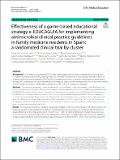Files in this item
Effectiveness of a game-based educational strategy e-EDUCAGUIA for implementing antimicrobial clinical practice guidelines in family medicine residents in Spain : a randomized clinical trial by cluster
Item metadata
| dc.contributor.author | Educaguia Group | |
| dc.contributor.author | del Cura-Conzalez, Isabel | |
| dc.contributor.author | Ariza-Cardiel, Gloria | |
| dc.contributor.author | Polentinos-Castro, Elena | |
| dc.contributor.author | Lopez-Rodriguez, Juan A. | |
| dc.contributor.author | Sanz-Cuesta, Teresa | |
| dc.contributor.author | Barrio-Cortes, Jaime | |
| dc.contributor.author | Andreu-Ivorra, Blanca | |
| dc.contributor.author | Rodriguez-Barrientos, Ricardo | |
| dc.contributor.author | Avila-Tomas, Jose F. | |
| dc.contributor.author | Gallego-Ruiz-de-Elvira, Elisa | |
| dc.contributor.author | Lozano-Hernandez, Cristina | |
| dc.contributor.author | Martin-Fernandez, Jesus | |
| dc.contributor.author | Azcoaga-Lorenzo, Amaya | |
| dc.contributor.author | Hernandez Santiago, Virginia | |
| dc.date.accessioned | 2023-03-20T16:30:03Z | |
| dc.date.available | 2023-03-20T16:30:03Z | |
| dc.date.issued | 2022-12-24 | |
| dc.identifier | 283750454 | |
| dc.identifier | c3bb6ef3-b72a-4f4d-8d9a-f00c40e36e1f | |
| dc.identifier | 85144635873 | |
| dc.identifier.citation | Educaguia Group , del Cura-Conzalez , I , Ariza-Cardiel , G , Polentinos-Castro , E , Lopez-Rodriguez , J A , Sanz-Cuesta , T , Barrio-Cortes , J , Andreu-Ivorra , B , Rodriguez-Barrientos , R , Avila-Tomas , J F , Gallego-Ruiz-de-Elvira , E , Lozano-Hernandez , C , Martin-Fernandez , J , Azcoaga-Lorenzo , A & Hernandez Santiago , V 2022 , ' Effectiveness of a game-based educational strategy e-EDUCAGUIA for implementing antimicrobial clinical practice guidelines in family medicine residents in Spain : a randomized clinical trial by cluster ' , BMC Medical Education , vol. 22 , 893 . https://doi.org/10.1186/s12909-022-03843-4 | en |
| dc.identifier.issn | 1472-6920 | |
| dc.identifier.other | ORCID: /0000-0003-3307-878X/work/131123465 | |
| dc.identifier.other | ORCID: /0000-0002-8544-1483/work/131588825 | |
| dc.identifier.uri | https://hdl.handle.net/10023/27230 | |
| dc.description | Funding: This study was funded by Instituto de Salud Carlos III (isciii) [file number PI11/0477, RD16/0001/0004] and co-funded by the European Regional Development Fund ‘A way to shape Europe; Research, Development and Innovation National Plan 2013–2016'. | en |
| dc.description.abstract | Background Clinical practice guidelines (CPGs) have teaching potential for health professionals in training clinical reasoning and decision‑making, although their use is limited. The objective was to evaluate the effectiveness of a game‑based educational strategy e‑EDUCAGUIA using simulated clinical scenarios to implement an antimicrobial therapy GPC compared to the usual dissemination strategies to improve the knowledge and skills on decision‑making of family medicine residents. Additionally, adherence to e‑EDUCAGUIA strategy was assessed. Methods A multicentre pragmatic cluster‑randomized clinical trial was conducted involving seven Teaching Units (TUs) of family medicine in Spain. TUs were randomly allocated to implement an antimicrobial therapy guideline with e‑EDUCAGUIA strategy ( intervention) or passive dissemination of the guideline (control). The primary outcome was the differences in means between groups in the score test evaluated knowledge and skills on decision‑making at 1 month post intervention. Analysis was made by intention‑to‑treat and per‑protocol analysis. Secondary outcomes were the differences in mean change intrasubject (from the baseline to the 1‑month) in the test score, and educa‑ tional game adherence and usability. Factors associated were analysed using general linear models. Standard errors were constructed using robust methods. Results Two hundred two family medicine residents participated (104 intervention group vs 98 control group). 100 medicine residents performed the post‑test at 1 month (45 intervention group vs 55 control group), The between‑ group difference for the mean test score at 1 month was 11 ( 8.67 to 13.32) and between change intrasubject was 11,9 ( 95% CI 5,9 to 17,9). The effect sizes were 0.88 and 0.75 respectively. In multivariate analysis, for each additional evidence‑based medicine training hour there was an increase of 0.28 points (95% CI 0.15–0.42) in primary outcome and in the change intrasubject each year of increase in age was associated with an improvement of 0.37 points and being a woman was associated with a 6.10‑point reduction. 48 of the 104 subjects in the intervention group (46.2%, 95% CI: 36.5–55.8%) used the games during the month of the study. Only a greater number of evidence‑based medi‑ cine training hours was associated with greater adherence to the educational game ( OR 1.11; CI 95% 1.02–1.21). Conclusions The game‑based educational strategy e‑EDUCAGUIA shows positive effects on the knowledge and skills on decision making about antimicrobial therapy for clinical decision‑making in family medicin residents in the short term, but the dropout was high and results should be interpreted with caution. Adherence to educational games in the absence of specific incentives is moderate. Trial registration ClinicalTrials.gov Identifier: NCT02 210442. Registered 6 August 2014. | |
| dc.format.extent | 13 | |
| dc.format.extent | 1135270 | |
| dc.language.iso | eng | |
| dc.relation.ispartof | BMC Medical Education | en |
| dc.subject | Health personnel/education | en |
| dc.subject | Professional competence | en |
| dc.subject | Experimental games | en |
| dc.subject | Problem solving | en |
| dc.subject | Practice guidelines | en |
| dc.subject | Game-based learning | en |
| dc.subject | RA0421 Public health. Hygiene. Preventive Medicine | en |
| dc.subject | NDAS | en |
| dc.subject | SDG 3 - Good Health and Well-being | en |
| dc.subject | MCC | en |
| dc.subject | NIS | en |
| dc.subject.lcc | RA0421 | en |
| dc.title | Effectiveness of a game-based educational strategy e-EDUCAGUIA for implementing antimicrobial clinical practice guidelines in family medicine residents in Spain : a randomized clinical trial by cluster | en |
| dc.type | Journal article | en |
| dc.contributor.institution | University of St Andrews. School of Medicine | en |
| dc.identifier.doi | https://doi.org/10.1186/s12909-022-03843-4 | |
| dc.description.status | Peer reviewed | en |
This item appears in the following Collection(s)
Items in the St Andrews Research Repository are protected by copyright, with all rights reserved, unless otherwise indicated.

